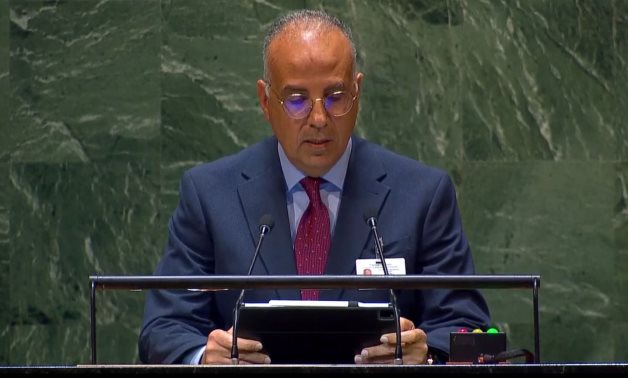
Minister of Water Resources and Irrigation Hani Sewilam delivers Egypt’s speech during the opening plenary of the 2023 UN Water Conference, 23 March 2023 - Egyptian Cabinet
CAIRO – 23 March 2023: Egypt has warned that the continuation of unilateral measures with regard to the Grand Ethiopian Renaissance Dam (GERD) can constitute an “existential danger” on 150 million citizens, in reference to the Egyptian and Sudanese population.
Egyptian Minister of Water Resources and Irrigation Hani Sewilam made the remarks as he delivered Egypt’s speech during the opening plenary of the 2023 UN Water Conference on Wednesday.
“Although it is said that hydroelectric dams cannot cause harm, the fact of the matter is that such unilateral and non-cooperative practices in the operation of this dam of exaggerated size can have a disastrous impact,” Sewilam stressed.
In the event of the continuation of such practices in parallel with a period of prolonged drought, more than 1.1 million people can lose their jobs and Egypt can lose almost 15 percent of its agricultural lands, the minister explained.
Sewilam warned that such practices can lead to an increase in social and economic tensions, exacerbate illegal immigration, and cause Egypt's food import bill to double.
The continuation of the construction and filling of the dam and starting its operation unilaterally constitutes a breach of the international law, including the 2015 Declaration of Principles (DoP), and is inconsistent with the UN Security Council presidential statement issued in September 2021 in this regard, the minister added.
Sewilam also highlighted GERD as one of the examples of the danger of unilateral acts that do not abide by the principles of the basins of transboundary rivers.
He asserted that Ethiopia started construction of the dam more than 12 years ago on the Nile River without conducting consultations or adequate studies on its safety or its economic, social and environmental effects on the riparian countries.

Egypt has frequently voiced concern over its water share, which amounts to 55.5 billion cubic meters, since its dispute with Ethiopia over the mega dam started in 2011.
Egypt and Sudan, the downstream countries, have slammed Ethiopia’s rejection to sign a legally-binding agreement on the filling and operation of the dam, which would preserve their interests against possible future dangers.
Officials have also reiterated that Egypt is one of the most water-scarce countries in the world with the person’s water share placing the country below the global threshold for water scarcity.
In his Wednesday speech, Sewilam said Egypt relies almost completely on the Nile River for its water resources, noting that no less than 75 percent of these resources is used for fulfilling food needs through agriculture.
The agricultural sector is the source of breadwinning for more than 50 percent of the population, the minister said.
He added that Egypt’s water shortage amounts to up to 55 percent of its water needs.
Meanwhile, Egypt is making huge investments to raise the efficiency of its water system, which surpassed $10 billion during the previous five-year plan, Sewilam said.
Egypt is also reusing water several times within this framework and is forced to import enormous food products worth about $15 billion, he added.
Comments
Leave a Comment